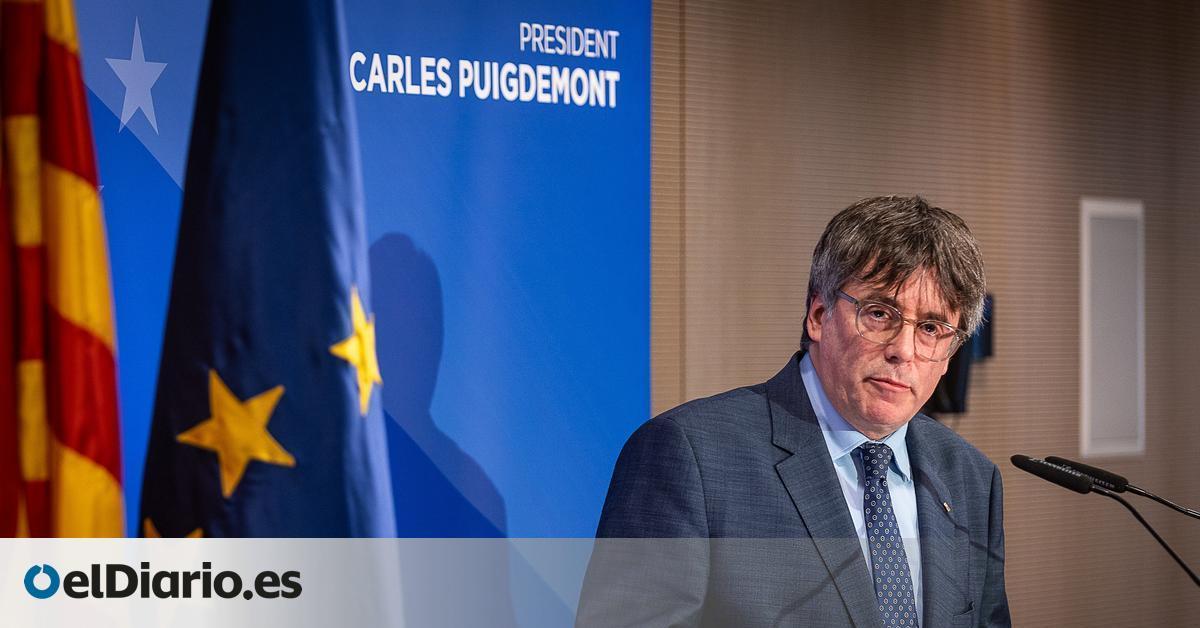
The judicial front against the Catalan independence process is entering unknown territory. The Supreme Court has decided to open a terrorism case against former president Carles Puigdemont and the Catalan deputy Rubén Wagensberg for the alleged role they played in promoting the Tsunami Democràtic platform and its massive demonstrations in 2019. The judges rely on the arguments of Manuel García Castellón, sentences on the ‘kale borroka’ and the criteria of the Supreme Court prosecutors to open proceedings with an uncertain course: neither of the two accused is in Spain and the investigator will have to ask Belgium and Switzerland to hand them over, if They do not appear voluntarily for terrorism crimes. All with the possible amnesty law as a backdrop and with the Prosecutor’s Office against it.
In a total of 32 pages, the Supreme Court relies on three fundamental legs to cement the opening of the case. Part of the reasoned exposition of Manuel García Castellón, the report of the Supreme Court prosecutors that, in the end, did not have real value and, finally, the jurisprudence of the Supreme Court itself on street terrorism and the ‘kale borroka’ of ETA and its around. The judges’ conclusion: Carles Puigdemont had “absolute leadership” over Tsunami Democrátic and was “informed” of its creation. A possible “low intensity” terrorism. García Castellón, in his reasoned presentation, also spoke of an “executive and leadership” position of the former president.
The Supreme Court points to six indications that, according to its criteria, support the opening of the case. Among them, the messages that his then Chief of Staff, Josep Lluís Alay, exchanged with Tsunami promoters. “I suppose that from Òmnium they will inform President Puigdemont directly,” said one of these messages a week before Tsunami Democrátic was announced. Another message asked to consult the former president about the launch date. And he also celebrated his arrival with a tweet.
We need to regain the initiative, and in all areas. This is a good, smart way. The commitment to non-violence makes us stronger, no one has any doubts about that. And yes, now the time for rematch begins. https://t.co/RNXvdkKKoi
— krls.eth / Carles Puigdemont (@KRLS) September 2, 2019
Puigdemont, the order adds, was in key meetings in Geneva a few days after the birth of Tsunami Democrátic. And, privately, he discussed with Josep Campmajó, a writer and businessman considered the promoter of Tsunami, the risks of the protests being violent: “The problem could only come if there were someone dead on either side, because that would be very hard.”
The Supreme Court relies on all these indications submitted by García Castellón, but does not mention one of the pillars of his accusation of terrorism: the death of a tourist due to cardiac arrest during the protests at El Prat airport.
The deceased tourist
The death of a French citizen Jean Claude Joseph Scherzinger was one of the key points of the terrorism accusation promoted by García Castellón. He suffered a heart attack and died in hospital after being transported. The judge who investigated the case refused to link him to Tsunami and the Mossos d’Esquadra also did not link his death to the massive protests that blocked the airport for hours.
That, according to García Castellón, “could have influenced the outcome of the death” and the death confirmed “the risk that the action carried out by the Tsunami could have posed to the integrity of the people” who were there. The Supreme Court does not mention the death in his order, although it does not downplay the violence with which, the order states, the protests took place. He even talks about “violence against people”, but stops short of attributing blame to the concentrations in the death of the French tourist.
Another crime that the Supreme Court puts on the table before talking about terrorism is illegal detention, a criminal term to refer to different types of kidnapping. It was like this, the judges say, because the collapse of the airport prevented “access for users and crew”, the control tower with the controllers inside was also “isolated” and a situation of “absolute chaos and violence” was generated. Tsunami, they add, acted with “perfect coordination”, covering his face and using dangerous instruments.
García Castellón’s reasoned statement did not refer to this possible crime related to the illegal restriction of the movements of a person that the Supreme Court relates to the alleged impossibility of the people who were at the airport to leave or enter. The Supreme Court does not close the door to coercion instead of illegal detention: “The international aviation service and airport services and air traffic were disrupted.”
Tsunami terrorism
The judges also dedicate several pages of their order to justify the accusation of terrorism, based not so much on García Castellón’s arguments as on the criteria of the courtroom prosecutors of the high court. An act can be considered terrorism if we are talking about a serious crime carried out to seriously disturb public peace or to force public powers to do something. That, the court says, is true in this case.
The criteria of the superior of these prosecutors, María Ángeles Sánchez Conde, do not deserve the same consideration: they accuse the lieutenant prosecutor of the Supreme Court of analyzing the evidence separately and subjectively so as not to see a crime of terrorism in Puigdemont. Thus delving into the division that the Prosecutor’s Office runs through on this matter.
The judges also respond, although without openly saying who they are responding to, to “some politicians and media” who, according to their order, limit terrorism only to ETA or radical jihadism. They are not, they say, the only possibilities to accuse someone of terrorism, in a car that puts several sentences on the table to define the contours of terrorism: several cases of ‘kale borroka’ in Donostia and Santutxu (Bilbao) and a zulo with explosives linked to ETA.
If Puigdemont’s role could have been that of those known as the “men behind” of terrorism, who plan and order but do not get their hands dirty, that of Rubén Wagensberg, ERC deputy in the Parliament of Catalonia, was that of “Konan ”. The nickname that, researchers say, he used in the Wire application to exchange messages related to the Tsunami Democràtic organization.
The unknowns of Europe and the amnesty
The case remains in the hands of the progressive magistrate Susana Polo. Rapporteur of the sentence that convicted the Pamplona Pack of rapesignatory of the private vote that requested acquit Alberto Rodríguez and of which He questioned the prison sentence for embezzlement de Griñán in the ERE of Andalusia, joined the Supreme Court in 2018 and is one of the few members of the Criminal Chamber who has not touched on the main causes of the Catalan independence process.
It is her responsibility to take the reins of a judicial procedure that will take place, above all, outside of Spain. The court itself recognizes that there is little left to do: take statements from the two accused. Some defendants who are outside Spain and, for the moment, have not shown any intention of returning to sit in the dock accused of terrorism.
Puigdemont left the country in 2017 and is currently an MEP in Brussels, while Wagensberg went to Switzerland denouncing a “political use” of the terrorism accusation. This, barring surprise, will force Polo to demand the extradition of both to Belgium and Switzerland. A process that, as the Supreme Court and in particular your colleague Pablo Llarena know, can take years to produce results.
Manuel García Castellón acted as an advance player a few weeks ago in Switzerland and did not obtain a promising result. The Swiss authorities questioned his request to locate Marta Rovira (ERC) for possible terrorism, which led to palpable anger from the judge of the National Court. As for Puigdemont, Pablo Llarena’s multiple attempts to bring him to Spain to respond to the main cause of the process have advanced some work: the European courts have already rejected that his immunity as a European parliamentarian protects him from any type of accusation that comes from the Supreme Court for the process.
It remains to be seen Polo’s strategy to face a circumstance that turns an instruction into an inexhaustible source of headaches for the Supreme Court. In the case of Puigdemont, he will have to request a new request, in addition to putting in place some extradition mechanism or arrest warrant that requires an analysis of the accusations by foreign authorities. In principle, and unless there is a radical change of opinion, the Prosecutor’s Office is against both accusations and the accusation of terrorism. A Prosecutor’s Office split in half that will not have easy management of the case either: the vast majority of the Supreme Court’s criminal prosecutors opted for indictment and only the lieutenant prosecutor and a few members advocated otherwise.
Everything also happens with another issue in the background: the possible and future amnesty law. The possibility of Puigdemont being accused of terrorism had become a stumbling block in the negotiations between PSOE and Junts, as well as the contours of this crime that the law could forgive: terrorism without “serious human rights violations.” The order of the Supreme Court that opens the case against Puigdemont, a case that the speaker will now have to outline, slips notes in her order: terrorism, she says, encompasses the “disruption” of citizen coexistence, “thereby making it difficult for the rights to be properly exercised.” fundamental rights included in our constitutional order.”
Source: www.eldiario.es

